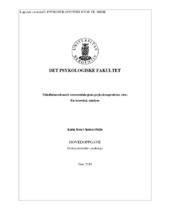Mindfulnessbasert stressreduksjons psykoterapeutiske etos: En teoretisk analyse
Master thesis
Permanent lenke
https://hdl.handle.net/1956/21324Utgivelsesdato
2019Metadata
Vis full innførselSamlinger
Sammendrag
Evidensbasert psykologisk praksis (EBPP) utgjør de viktigste styringsprinsippene for å regulere psykoterapeutisk behandling og forskning i Norge i dag. Teksten redegjør for utviklingen av EBPP-rammeverket og hvordan dette regulerer klinisk psykologi. Tekstens hovedpåstand er at EBPP i liten grad inkorporerer verdiene som finnes i psykoterapi praksis. Ulike psykoterapeutiske tilnærminger inneholder en rekke normative grunnforutsetninger, her betegnet som psykoterapeutisk etos. Etoset omhandler forhold som tilnærmingens menneskesyn, konseptualiseringen av lidelse, rollefordeling i terapisituasjonen og forholdet mellom kropp og sinn. Oppgaven inneholder en analyse av det psykoterapeutiske etoset til Mindfulnessbasert Stressreduksjon (MBSR). MBSR har vært toneangivende for utviklingen av mindfulnessbaserte tilnærminger i psykologien. Avslutningsvis drøftes kliniske implikasjoner etoset har med et særfokus på brukermedvirkning. Evidence-based psychological practice (EBPP) are currently the most important guiding principles for regulating psychotherapeutic treatment and research in Norway. This paper describes the development of EBBP and shows how this framework regulates psychotherapy. Its main assertion is that EBPP does not embody the existing values in psychotherapy practice. Different psychotherapy schools contain a nexus of normative assumptions, here called psychotherapeutical ethos. These ethoses contain answers to questions like what is a human being, what is suffering, what are the roles of the patient and therapist and what is the relationship between mind and body. The paper contains an analysis of the psychotherapeutical ethos of the Mindfulnessbased Stressreduction Program (MBSR), which arguably has been the most influential mindfulness based approach. Finally, the paper discusses clinical implications of psychotherapeutical ethos with a particular focus on user involvement.
